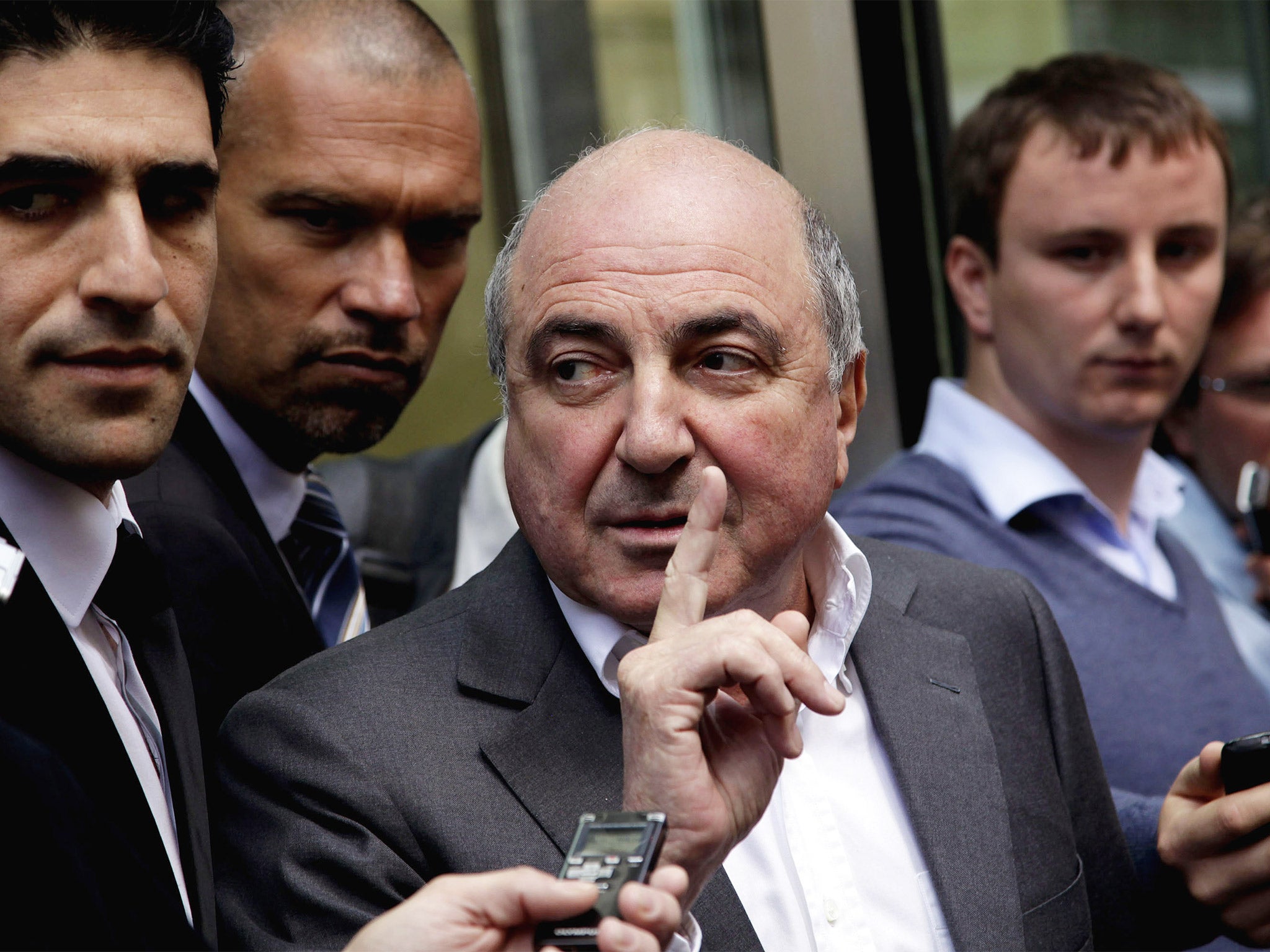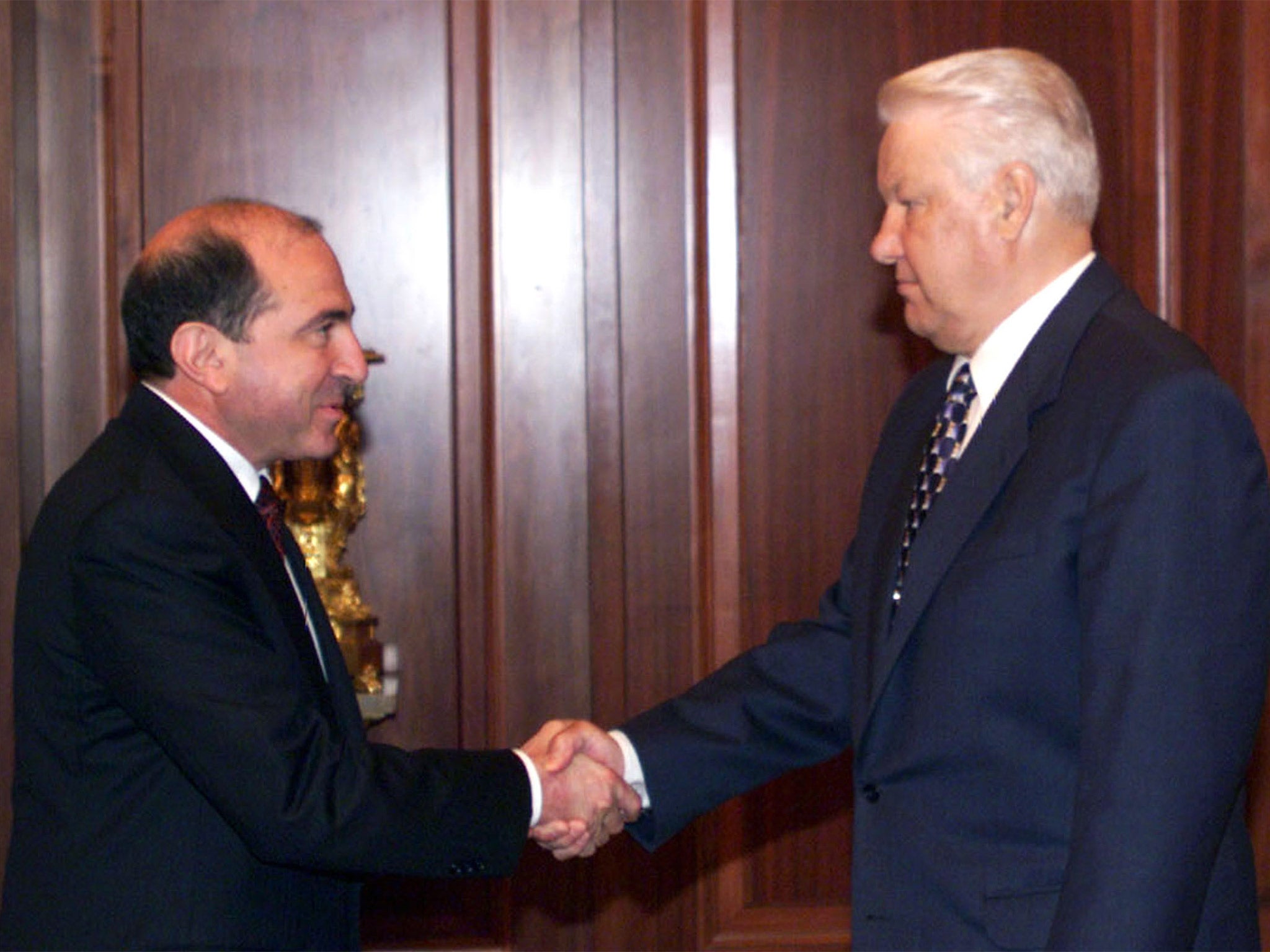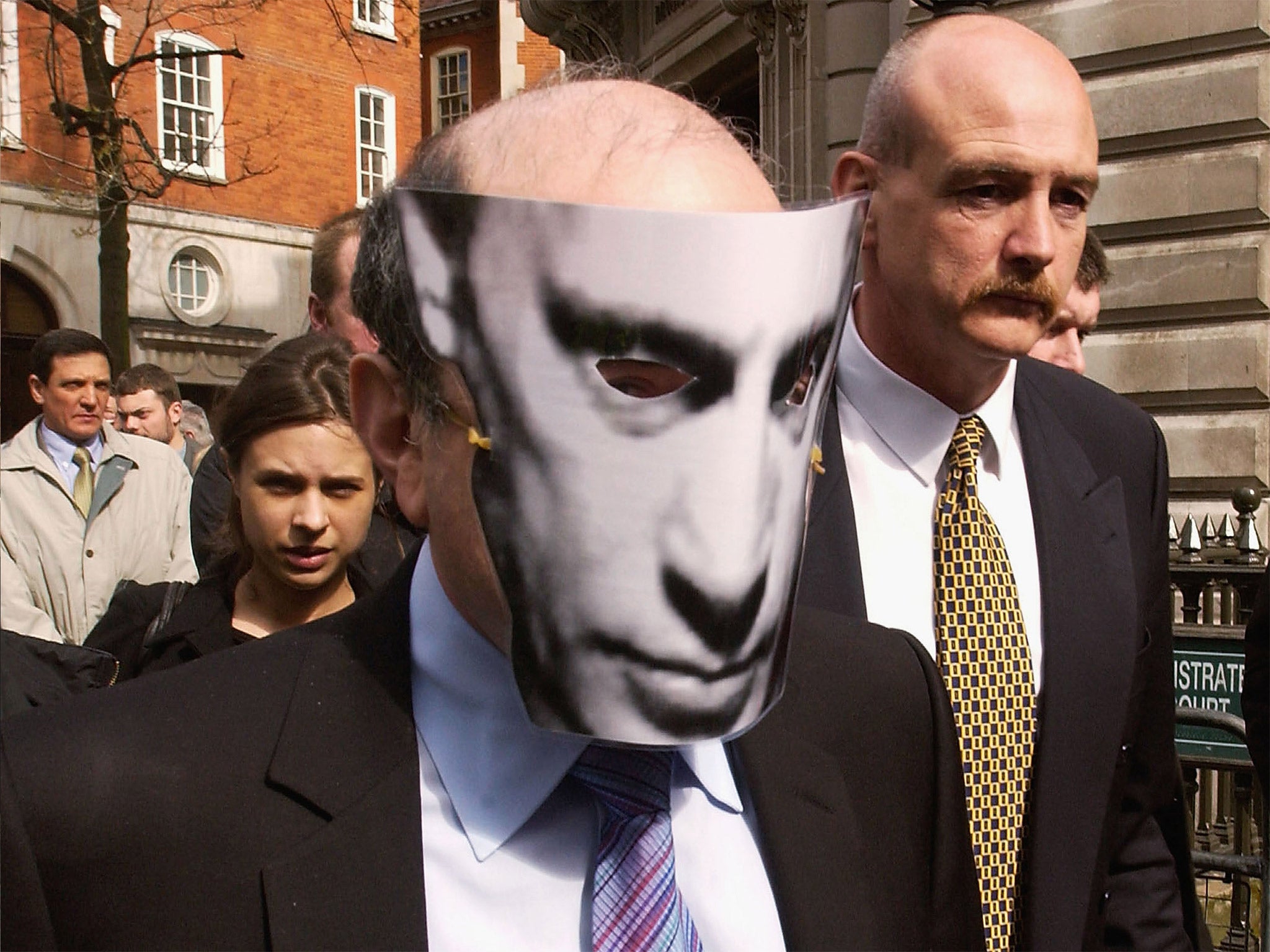The weird world of Boris Berezovsky: Alexander Litvinenko's inquest has provided an intriguing insight into the dead tycoon
The Litvinenko inquest has a gripping subplot: the extraordinary life and death of Boris Berezovsky. After sitting through hours of evidence, Mary Dejevsky reveals a new portrait of the oligarch who became an enemy of the Russian state

Your support helps us to tell the story
From reproductive rights to climate change to Big Tech, The Independent is on the ground when the story is developing. Whether it's investigating the financials of Elon Musk's pro-Trump PAC or producing our latest documentary, 'The A Word', which shines a light on the American women fighting for reproductive rights, we know how important it is to parse out the facts from the messaging.
At such a critical moment in US history, we need reporters on the ground. Your donation allows us to keep sending journalists to speak to both sides of the story.
The Independent is trusted by Americans across the entire political spectrum. And unlike many other quality news outlets, we choose not to lock Americans out of our reporting and analysis with paywalls. We believe quality journalism should be available to everyone, paid for by those who can afford it.
Your support makes all the difference.When Boris Berezovsky was found hanged at his ex-wife's Berkshire mansion on 23 March 2013, it seemed that the last chapter in the colourful and complicated life of the exiled Russian oligarch had been written. Any secrets – and there were presumed to be many – would accompany him to his grave at Brookwood Cemetery.
True, there were intriguing postscripts. It was revealed that, in what were to be his last weeks, Berezovsky had penned two personal letters to his arch-enemy, President Vladimir Putin, pleading to be allowed back to his native Russia. Then there was the open verdict pronounced at the inquest a year ago, which left a sliver of doubt about his death by suicide (though the coroner said it was hard to believe that any assassin would come so ill-equipped that he had to use his victim's own cashmere scarf). Then finally, or so it seemed, the high court in London declared Berezovsky's estate insolvent, finding that he had owed the UK taxman £46m when he died.
But even these rather undignified details were not, as it turned out, the last we heard of Berezovsky. For the past two months, the deceased Russian oligarch has been living out a second life in court 73 at the Royal Courts of Justice in the Strand. He is playing a prominent, if spectral, role at the long-delayed inquiry into the death of Alexander Litvinenko, the fugitive spy believed to have been murdered by radioactive poison in November 2006. And what has been emerging, from hours of painstaking evidence, not only throws new light on this mysterious schemer and his decade in British exile, but calls into question at least some of what was supposedly known before.
A maths whizz, whose talents had taken him to graduate studies at Moscow University, despite the Soviet Union's restrictions on Jews entering the most important institutes of learning, Berezovsky forsook academia to capitalise on the economic chaos that attended communism's collapse. Starting small, by importing second-hand cars from Germany, he founded a subsidiary of Avto-VAZ, the Soviet-era manufacturer of the popular Lada cars. From there, he branched out in all sorts of directions: media tycoon; shareholder in the national airline, Aeroflot; and speculator in the oil and gas business (which is how his path crossed, expensively, with that of fellow oligarch Roman Abramovich).

Through the 1990s, he used his money to buy personal ease and political influence in Russia. By 1999, when the ailing Boris Yeltsin announced he was bequeathing the presidency to Vladimir Putin, Berezovsky had insinuated himself into Yeltsin's inner circle, attained the post of deputy national security adviser, and – it was said – designated himself the king-maker who shepherded Putin to power.
Berezovsky regarded Putin as his friend. But he had disastrously misread his protégé. Within six months of taking over in the Kremlin, the new president had secured his position with an electoral mandate and Berezovsky's star was in sharp decline. Almost overnight, his influence had gone; he was subject to investigations as to the sources of his fortune, and warnings that his life was in danger crowded in. He spent more and more time at his estate on the French Riviera. But when the time came to settle outside Russia, his choice fell on the UK. It was the end of 2000. Three years later, he was granted political asylum, after what seemed unusually hush-hush proceedings.
There was, of course, good reason for the official reticence. As the Foreign Office reportedly advised, asylum for Berezovsky was a move that would infuriate the Russian authorities – as well as many ordinary Russians who felt affronted that a man who had, they believed, enriched himself mightily at their expense would not be returning to face a court. Sure enough, UK-Russia relations went into deep freeze, a state from which they have barely emerged since.
On thus securing his position in the UK, Berezovsky busied himself with his entrée into British society – becoming a frequent and welcomed figure, for instance, in the House of Lords. He sponsored public events, where he would pursue what was now a vendetta against Putin. He set up a charitable fund to support his work, the disingenuously named International Foundation for Civil Liberties, and commissioned a stream of publications hostile to the Russian government.
As has emerged since the Litvinenko Inquiry opened in late January, however, Berezovsky was not only infiltrating the upper echelons of British society and doing his best to turn opinion against Putin. He was also spinning a web of patronage in the world of Russia's anti-Putin emigres, of whom there was a large and growing London contingent in London. Alexander Litvinenko and his family were among them.
Berezovsky paid Alexander – known to everyone as Sasha – a monthly stipend to the tune, at the outset, of around $6,000 (£4,100). His duties included drafting books and other material that exposed corruption in Russian state institutions, especially in the FSB (the post-Soviet successor to the KGB), where he had worked. Berezovsky also paid for the house the Litvinenkos occupied in Muswell Hill, as well as private school fees for their son, Anatoly. Many payments were made, according to his poker-faced Russian-Israeli aide, Michael Cotlick, through tax-efficient trusts in Gibraltar.

Other beneficiaries of Berezovsky's largesse included a further thorn in the Kremlin's side: Akhmed Zakayev, a Chechen leader who was also granted UK asylum with his family, while wanted for murder and kidnapping in Russia. And his circle also numbered Alex Goldfarb, a garrulous Soviet-born academic chemist, who had worked for George Soros in the 1990s, with a charity that helped Russian scientists. (It was in that capacity that he encountered the influential Berezovsky.) However, Goldfarb fell out with Soros – and further in with Berezovsky – after he organised the Litvinenkos' escape.
It was Goldfarb who became the link man for Litvinenko as he lay desperately ill at University College Hospital; who presented the ghoulish photo that still defines Litvinenko's death, and who (it emerged at the inquiry) was largely responsible, along with Litvinenko's British lawyer, for drafting the death-bed statement that accused Putin of murder.
But Berezovsky's circle ranged even more widely. He kept his finger in an extraordinary number of pies. There were networks from his days at the heart of Russian power; international networks established during his years in Russia as a media magnate and then émigré propagandist; and tentacles that extended into Israel and the former Soviet bloc. There is almost no one, among the dozens who have testified at the Litvinenko Inquiry, who has not mentioned Berezovsky in some context.
Probably his closest friend – until a posthumous falling-out over wills – was Badri Patarkatsishvili, a business partner originally from Georgia, who died suddenly at his Surrey home in 2008. In a statement given to police after Litvinenko's death, Patarkatsishvili revealed how closely he and Berezovsky had co-operated on media matters, and the extent of their support for both the 2003 Rose revolution in Georgia, and the Orange Revolution in Ukraine the following year.
And then there was Andrei Lugovoy, the ex-KGB agent – now ensconced in Moscow and protected from either extradition or indictment by some niceties of Russia's constitution – who is accused of placing the fatal dose of radioactive polonium in Litvinenko's tea. Lugovoy, it is known, served as a special FSB protection officer to senior Kremlin officials in the early 1990s, before leaving and setting up his own security company – providing protection to some of those very same people. The precise nature of relations between Berezovsky and Lugovoy has remained cloudy, through almost two months of testimony at the inquiry, although their links with each other and Litvinenko go back further than those between almost any other of the main players.
Certainly, Lugovoy organised security, through his private company, both for Berezovsky's Russian media empire and for members of his family after he left. These services were recognised by Berezovsky when he invited Lugovoy to his 60th birthday party, held at Blenheim Palace, no less, in January 2006 – the last, perhaps the only, time that so many of Berezovsky's circle were gathered in one place.

But witnesses from Berezovsky's circle have also asserted that – although the oligarch had trusted Lugovoy to provide security over many years, and although Lugovoy dropped into the oligarch's offices when he was in London and partook of his select wines – relations between them were on a strictly business footing. Any suggestion that Berezovsky might have hired Lugovoy for more nefarious purposes – against Litvinenko, for instance – has been dismissed.
Indeed, among the many who frequented Berezovsky's strangely dismal offices in Mayfair, Litvinenko would appear to be one of the less significant – the relationship being a bit more than that of benevolent patron and supplicant. Berezovsky, it has often been reported, believed Litvinenko saved his life more than once, and felt obliged to return the favour.
The story goes that in 1997 Litvinenko had been ordered by his FSB bosses to arrange Berezovsky's assassination, or even to carry it out. Instead, Litvinenko passed on a warning, an act that Berezovsky believed saved his life, and which was seen by the FSB as treachery. When things then became too dangerous for Litvinenko in Russia, Berezovsky facilitated and funded his escape, via Georgia and Turkey, putting his private plane, as well as Goldfarb and another trustie, at the family's disposal.
That was in November, 2000. It was only a matter of weeks before the oligarch himself decided not to return to Russia and the whole Berezovsky circus – with its frenetic comings and goings, its cloak-and-dagger private-plane travel, and its ferocious anti-Putin rhetoric – relocated to London.
Berezovsky's sojourn in Britain always posed questions, but the inquiry into Litvinenko's death has raised more. One concerns the extent to which Berezovsky's life was really in danger in Russia (the argument, it is believed, that clinched his asylum claim). Another concerns relations between the UK and Russia.
The inquiry has heard from several witnesses that Litvinenko and Berezovsky fell out in the summer before he died, though it is not entirely clear why. According to some, the dispute stemmed from a reduction, or even the severing, of Litvinenko's stipend; others said that Litvinenko's paid work for MI6 was a bone of contention. The quarrel, most agreed, was patched up well before Litvinenko's death. But a recurrent theme of some testimony was that Litvinenko held a crucial secret: at least some of the death threats against Berezovsky, it was said, had been concocted for the sole purpose of obtaining UK asylum.
It is not necessary to "buy" this theory's extension – that Litvinenko was preparing to blackmail Berezovsky – to feel that such knowledge could have given him a hold, and provided a less noble motive for his patronage.
The second question concerns relations between the UK and Russia in the months before Litvinenko's death. In the first five years of his exile, Berezovsky seems largely to have been left alone by the British authorities. But in February 2006, after Berezovsky told a Moscow radio station that he wanted to replace what he called Putin's "anti-constitutional regime", the then-Home Secretary, Jack Straw, pounced.
He took the highly unusual step of warning him, in a letter made public in a Commons statement, that his asylum could be reviewed. The government, Straw said, would act "against those who use the UK as a base from which to foment violent disorder or terrorism in other countries". Berezovsky piped down a bit.
It now transpires, though, that the warning may have gone further than words. In a statement given to police in a different (libel) case, which was placed on the record at the Litvinenko Inquiry, Andrei Lugovoy says this: "During our dinner at one of the Chinatown restaurants in London, Litvinenko... touched upon the resumed negotiations between Russia and the UK regarding Berezovsky's extradition..." This was in October 2006.

It would be easy to dismiss the statement, just because it comes from the chief murder suspect. But the en passant nature of the remark suggests it was something well known in Berezovsky's circle. The timing is also plausible.
Straw's intervention earlier in the year suggests Berezovsky had outstayed his welcome in Britain, and Russia is known to have submitted a new extradition request soon thereafter. (Granting that request would have improved bilateral relations almost overnight.) I have tried to confirm that talks were indeed taking place that autumn about the oligarch's possible return to Russia. But a spokesman for the same Home Office that was so reluctant to divulge Berezovsky's successful asylum application in 2003, said in the time-honoured phrase that he would "neither confirm nor deny" that talks had taken place. Note, this is not a denial.
I draw no link between any reopening of the Berezovsky case and Litvinenko's death (though some might) and see no reason to question Berezovsky's express denials of involvement. But the effect of Litvinenko's death was to destroy any UK-Russia rapprochement that might have been in train. The following April, Berezovsky went even further than before, telling The Guardian that Putin had to be removed by force. Despite loud objections from Moscow, the UK government let this pass.
With relations icy once more, the heat was off Berezovsky. He was able to spend six more years using and abusing British hospitality. By 2012, however, his luck was finally running out. He lost his high-profile claim against Roman Abramovich in a verdict that not only depleted his shrinking resources but demolished his credibility. Soon afterwards, he wrote his first begging letter to Putin, and then a second. But answer came there none.
By the spring, depressed and defeated, Berezovsky was dead. But the dividend of better UK-Russia relations – that might have been expected – has not ensued. With lawyers in the Litvinenko Inquiry arguing, day by day, that the Russian state was responsible for the spy's death, and with Putin in the international dock over Ukraine, any warming of relations is still a long way away.
Even now, though, Boris Berezovsky can still spring a surprise. In a bizarre footnote to the Litvinenko killing, the inquiry heard that, in 2010, the oligarch received a black T-shirt, sent by Lugovoy from Moscow. The garment carried the logo of the Moscow football team CSKA, and the macabre legend "Nuclear death is knocking at your door". According to an aide, Berezovsky had interpreted the gift as both "a joke" and an "admission of guilt". He turned it over to the Metropolitan Police.
Join our commenting forum
Join thought-provoking conversations, follow other Independent readers and see their replies
Comments